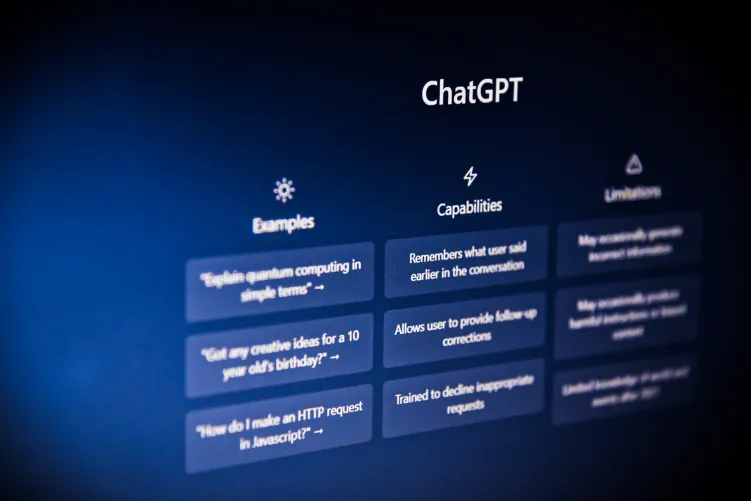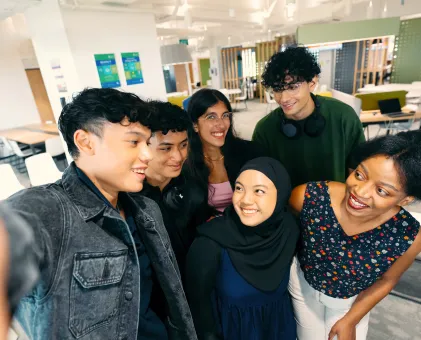Understanding chatbots for universities

Higher education institutions are under immense pressure to replicate the immediacy of social media platforms. Prospective students don't want to wait five business days for a response to their queries: they want instant answers. That's why chatbots have become so popular in universities.
What are Chatbots?
The term chatbot might evoke images of cartoon computers, but in real life they are widgets that sit unobtrusively in the lower corner of your landing page, waiting to answer queries.
Chatbot technology is by no means the most advanced technology on the market (yes, that includes ChatGPT!), but it provides almost instant support for people with common questions. Website owners can pre-load their chatbot with answers to FAQs and basic queries, which will be all the support most users will need.
Types of Chatbots for Universities
There are two main types of chatbots.
- Simple chatbots - Simple chatbots operate on predefined words and phrases, which your developer needs to manually code into the system. This can be time-consuming, and if not done right it can seriously impact the student experience. For example, if a student asks your chatbot 'What is the enrolment process?', but the chatbot is only coded to answer 'How do I enrol?', the student will not get the support they need. For this kind of chatbot, you need to have a developer on hand to edit the code.
- Intelligent chatbots - True to its name, an intelligent chatbot has much better capabilities and can operate without much input. These kinds of chatbots are built with AI and natural language processing technology, so your developer doesn't need to input predefined questions and answers into the system. Instead, the chatbot will log all the questions and answers received and use them as a future basis for communication.
Of course, there are advantages and disadvantages to both kinds of chatbots. Ultimately, they are imperfect tools, but they can solve a lot of common problems for higher education institutions.
Problems that Chatbots Solve for Universities
24/7 Student Support
When you have a university office day, who answers queries? And how about the holidays? Even clocking off for the day can impact your enrolment numbers.
A study from Microsoft found that the average person has an attention span of eight seconds- which means that yes, your institution has just eight seconds to make an impression.
Swift communication can make or break student retention and recruitment, so you need to have a plan in place even when you are not in the office. And chatbots are an important part of that.
Prospective students might not have time to research potential universities in the daytime. By investing in a chatbot, you'll never lose another prospect to 9-5 working hours.
Answer Subject-Specific Questions
Personalised responses are far better than general answers, and Gen Z knows the difference. A study found that 44% of U.S.-based internet users would leave a brand that doesn't personalise content for one that does. If used correctly, intelligent chatbots can provide a personal experience.
There are a few advanced AI-powered chatbots out there, but simple ones are at the mercy of your marketing team. They will recite any commands, questions, and answers that you put into them.
Here is an example of how you can create a subject-specific chatbot.
Chatbot: What subject do you want to study?
User: Chemistry
Chatbot: I've found 4 degrees with the word 'chemistry' in the title. Here they are. Click on each option to go to the course specifications.
As you can see, chatbot technology can give students easy access to vital information. Potential students can use chatbots to access information that's otherwise difficult to find. Chatbots can even escalate the query to faculty members when every other avenue has been exhausted.
Less Admin for Teachers
During the enrolment process, higher education admissions teams have to answer the same questions over and over again. Usually, the questions are quite basic, like 'what date is the enrolment deadline?' and 'what should I include in my supporting statement?'
Even the simplest university chatbots can answer these kinds of questions, which means that university staff members don't have to deal with piles of emails every Monday morning. They have more time to write lesson plans, grade essays, and engage with current students. Ultimately, this means that existing students have better day-to-day interactions.
Affordable Alternative
Needless to say, chatbots are a more affordable option than hiring extra admin staff. It's not uncommon for universities to have entire departments devoted to answering questions and calls, but it can be very costly.
Once chatbots are installed, they can start working straight away! You do not have to pay for sick days, temporary staff members, or holidays.
Collect Student Data
When using chatbots, students part with their data. In the world of higher education, data is a valuable resource. Your admissions department can use the data to tweak their strategies, reconfigure courses, and above all, help students.
If your chatbot operates from a pre-programmed script, you can add questions and answers that encourage students to share their data. Student responses can tell you how they interact with your brand, website, and courses.
Of course, you should always provide students with valuable information and support in return.
Support for Current Students
It might seem like university chatbots are just for prospective students, but they can also be very helpful to current ones. For example, Staffordshire University introduced Beacon, an intelligent chatbot for mobile apps that answers 400 pre-determined questions about timetables, day-to-day campus life, and student support services. It also connects students with faculty members.
Chief Technology Office Andy Barrow said, 'Staffordshire University is a true trailblazer, and is setting the blueprint for the future of higher education across the UK.'
With Gen Z spending so much time online, it makes sense to communicate with them on comfortable ground. Chatbots offer immediate support, replicating the fast response times that students experience on social media platforms. Prospective students may even feel as if they are sharing text messages with a friend.
How Peer-to-Peer Chats Are Better Than Chatbots
Chatbots have their place, but they can't replicate the feeling of speaking to a real person. That's why universities all over the world also employ student ambassadors to engage with prospective students in one-on-one conversations.
Peer-to-peer chats are invaluable, especially for potential students who feel anxious about the prospect of moving hundreds of miles away from home. By employing kind, welcoming ambassadors, you can give nervous students a real insight into life at your university.
{% video_player "embed_player" overrideable=False, type='hsvideo2', hide_playlist=True, viral_sharing=False, embed_button=False, autoplay=False, hidden_controls=False, loop=False, muted=False, full_width=False, width='1920', height='1080', player_id='107541236385', style='' %}
The Ambassador Platform: Direct One-On-One Chats
The Ambassador Platform is an all-in-one iframe that embeds into your website.
With our platform, you can build on the popularity of chatbots. Chatbots pale in comparison to human interaction with a trained ambassador. Ambassadors lead the way in peer-to-peer marketing, something that's become (rightfully) more and more prominent in the last few years.
With The Ambassador Platform, potential students can get answers from peers who have already experienced all the ups-and-downs of university life.
A university that took full advantage of this is The University of Sheffield, which used peer-to-peer chat as part of its clearing strategy resulting in a staggering 87% lead-to-enrolment rate, connecting ambassadors with prospective students from 19 different countries through our platform.
Direct chats open up new avenues of communication with perfect-fit students who might have been very hard to reach otherwise. A conversation with a real-life student can make all the difference, especially so for international students who feel anxious about moving away from their home countries.
The Ambassador Platform can do a lot to support your student recruitment. Book a call with the team to learn more.


